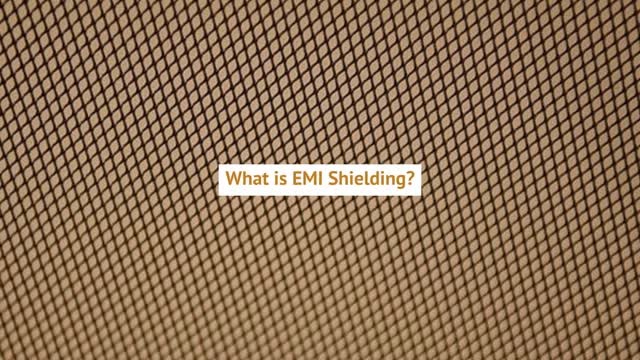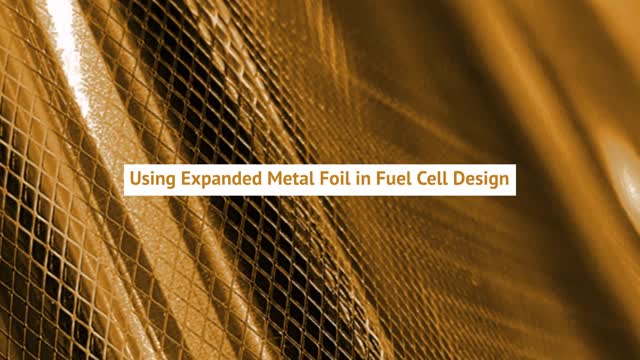What Is EMI Shielding?
CThru Metals is a leader in the expanded metal foil industry, serving clients in the aerospace, filtration, renewable energy, automotive, and other markets. The applications of expanded metals in these sectors are highly diverse, so our team is experienced in providing all manner of specialized metals with unique specifications. One of the core applications of expanded metal foils is electromagnetic interference (EMI) shielding.
This blog will explore what EMI shielding is, the industries that use EMI shielding, and more.
What Is EMI Shielding?
EMI shielding refers to a type of protection against electromagnetic waves. All electronic devices emit some amount of electromagnetic energy, which may cause devices to interfere with each other if they are not properly safeguarded against these waves. The interference can result in mixed signals, static, and device malfunction.
EMI shielding is typically a conductive piece of metal affixed around the electronic components that give off electromagnetic signals. This form of shielding is required for devices to have electromagnetic compatibility (EMC), which means they operate efficiently and legally.
The Importance of EMI Shielding
The modern age is defined by electronic technology. From televisions to lighting to cell phones, all of them can potentially be affected by electromagnetic interference unless they are properly shielded. Increased data processing and communication demands represent additional sources of electromagnetic noise pollution. Even solar flares and lightning strikes can cause EMI disturbances in electrical distribution and transmission systems.
Without EMI shielding, we wouldn’t be able to take advantage of new electronic innovations because they would be inconvenient or even hazardous to use. EMI shielding blocks external waves from disrupting a device’s internal parts while preventing those internal components from disrupting other devices. Shielding protects devices in contact with one another (conducted EMI), those not in direct contact but in close proximity (magnetic and capacitive EMI), and those separated by longer distances (radiated EMI).
Industries That Utilize EMI Shielding
Any industry that utilizes electronics makes use of EMI shielding in some form. Some examples include the following:
- Aerospace
- Automotive
- Consumer Electronics
- Healthcare
- Medical Devices
- Telecommunications and IT
Benefits of EMI Shielding
EMI shielding components are necessary in electronic devices because they minimize or eliminate harmful interference that can cause data loss, errors, device damage, and malfunction. EMI shielding also boosts the device’s performance by protecting it from external noise.
What Materials Act as EMI Shielding?
While any material that blocks EMI can act as shielding, the most effective material used in electronics is metal. Some common metals used in shielding components include the following:
- Copper
- Aluminum
EMI Shielding Products From CThru Metals
EMI shielding is a must for all electronic devices. CThru Metals’ Mesh™ expanded metal foils act as a Faraday cage to effectively block electromagnetic interference, keeping your signals clean and your devices functioning smoothly. Our team can work with you to create a custom configuration based on the EMI shielding needs of your application.
Our ISO 9001:2015 certification means we provide consistent high quality for every customer’s project. Request a quote today to get started on your solution.
Using Expanded Metal Foil in Fuel Cell Design
Fuel cell manufacturers are consistently dedicated to enhancing their products’ versatility, durability, and cost-effectiveness. They explore various methods to achieve these objectives, such as innovative designs and materials. An increasingly favored strategy among fuel cell manufacturers is the integration of expanded metal foil into their fuel cell designs, as it presents significant advantages in pursuing these goals.
CThru Mesh™ precision expanded metal foils find utility across multiple layers within a fuel cell stack. We’re committed to working closely with you to precisely manufacture your dimensional requirements, achieving the desired balance of conductivity and weight for your specific fuel cell needs.
Why Use Expanded Metal Foil in Fuel Cells
When confronted with weight restrictions and the imperative to create the lightest possible fuel cell, opting for expanded metal foil is an ideal choice. This material, characterized by its remarkable combination of lightweight properties and robustness, requires a lower quantity of metal per unit area. The ability to eliminate scrap and employ lighter metals proves highly advantageous. Integrating expanded metal foil into your fuel cell applications can curtail material costs and elevate the performance and longevity of your product. Harnessing the potential of expanded metals can result in comprehensive enhancements to your product designs.
Benefits of Expanded Metal Foil in Fuel Cells
Implementing expanded metal foil into your fuel cell design offers the following benefits:
- Versatility: The flexibility of expanded metal foil strongly appeals to manufacturers across diverse industries with various applications. Given that different types of fuel cells demand varying metals and specific properties, expanded metal foils provide the broadest range of options, capabilities, and resources.
- Conductivity: Expanded metal foil crafted from a single solid metal sheet excel as conductors. Their conductivity remains consistent, unaffected by pressure-induced strand movement. This uniformity is critical for the efficiency of fuel cell stacks, ensuring consistent performance across cell layers. Expanded metals exhibit electrical conductivity and effectively conduct magnetic flux and thermal heat, further enhancing fuel cell performance.
- Strength-to-Weight Ratio: The structural integrity of a metal is a key consideration in material selection for applications. However, opting for expanded metal foil over a solid metal sheet offers distinct advantages.
- Maximized Surface Area at Reduced Costs: When working with precious metals like niobium, zirconium, nickel, silver, or titanium, expanding the metal foil minimizes material costs. Expanded metal foils are considerably more cost-effective than similar perforated or woven products.
Fuel Cell Applications
Expanded metal foil offers significant design advantages, accommodating thin foils of precious metals like nickel, titanium, zirconium, and silver. Fuel cell manufacturers continually prioritize enhancing their products’ versatility, durability, and cost-effectiveness. To achieve these goals, they explore various avenues, including innovative designs and the adoption of new materials. Many fuel cell manufacturers integrate expanded metal foils into their designs to achieve these objectives.
Custom Expanded Metal Foil Solutions From CThru Metals
When selecting an expanded metal foil company, it is important to choose a partner that understands and meets your needs and requirements. At CThru Metals, we collaborate closely with your team to identify the right material, size, and configurations for your expanded metal project. With our extensive experience in the expanded metal and metal fabrication industries, you can trust us to efficiently handle the job. Feel free to contact us for more information or to request a quote.




